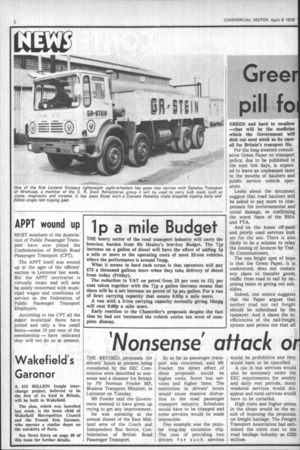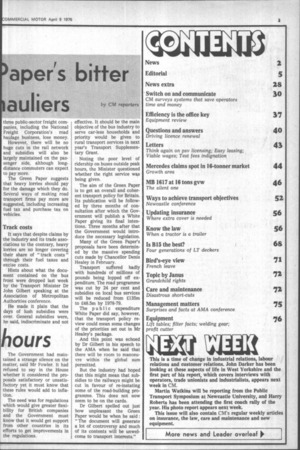Gree r
Page 4

Page 5

If you've noticed an error in this article please click here to report it so we can fix it.
aper's bitter
pill fo
auliers by CM reporters GREEN and hard to swallow —that will be the medicine which the Government will dish out next week as its cureall for Britain's transport ills.
For the long awaited consultative Green Paper on transport policy, due to be published in the next few days, is expected to leave an unpleasant taste in the mouths of hauliers and public service vehicle operators.
Leaks about the document suggest that road hauliers will be asked to pay more to compensate for environmental and social damage, so confirming the worst fears of the RHA and FTA.
And on the buses off-peak and poorly used services look set for the axe. There is also likely to be a scheme to relax the issuing of licences by Traffic Commissioners.
The one bright spot of hope is that the Green Paper, it is understood, does not contain any plans to transfer goods traffic from road to rail by imposing taxes or giving out subsidies.
Indeed, one source suggests that the Paper argues that neither road nor rail freight should be subsidised by the taxpayer. And it slams the inefficiencies of the rail-freight system and points out that all three public-sector freight companies, including the National Freight Corporation's road haulage business, lose money.
However, there will be no huge cuts in the rail network and subsidies will also be largely maintained on the passenger side, although longdistance commuters can expect to pay more.
The Green Paper suggests that heavy lorries should pay for the damage which they do. Several ways of making road transport firms pay more are suggested, including increasing fuel tax and purchase tax on vehicles.
Track costs
It says that despite claims by the industry and its trade associations to the contrary, heavy lorries are no longer covering their share of "track costs" through their fuel taxes and excise costs.
Hints about what the document contained on the bus front were dropped last week by the Transport Minister Dr John Gilbert speaking at the Association of Metropolitan Authorities conference.
He made it plain that the days of lush subsidies were over. General subsidies were, he said, indiscriminate and not




























































































































